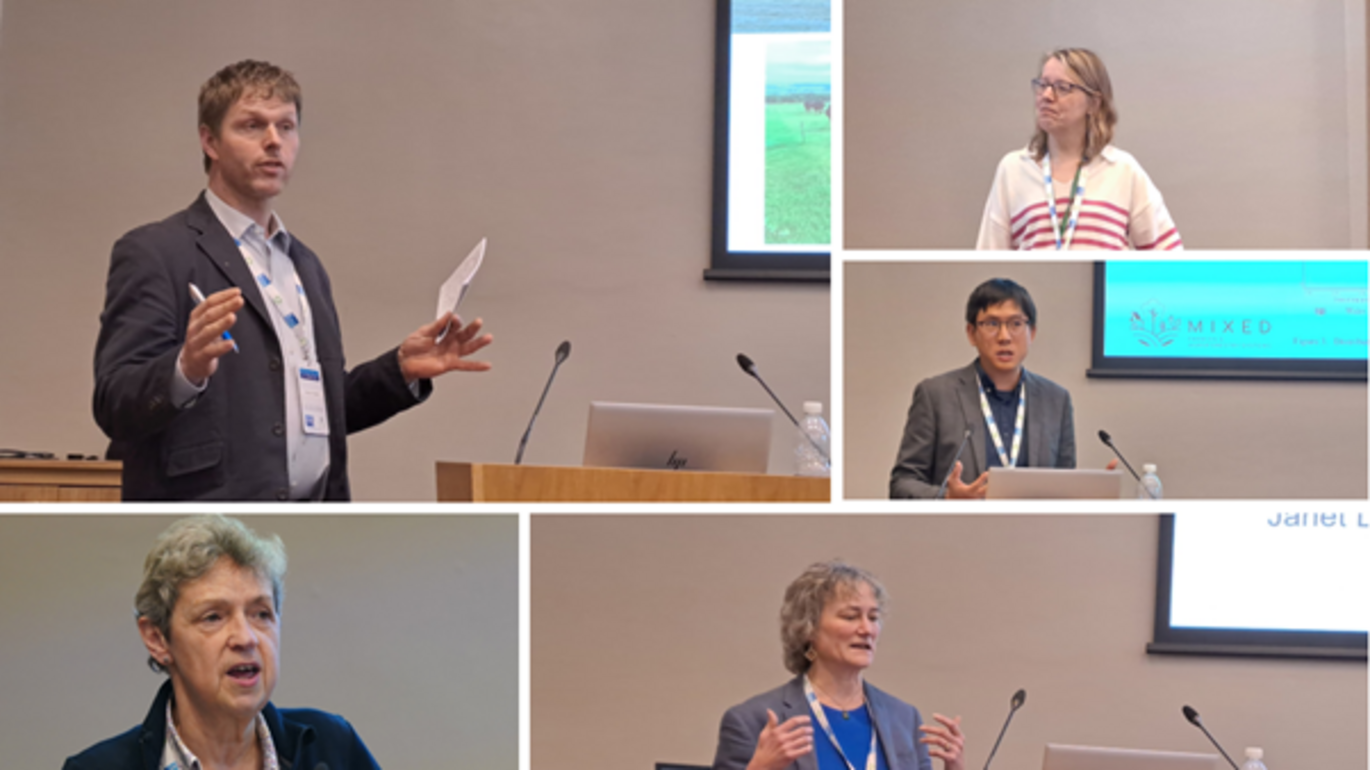Is Mixed farming Sustainable?
MIXED hosted a workshop at the annual Agricultural Economics Society Conference. The focus of the transdisciplinary workshop was: are these systems more robust and resilient than specialised farms?

The Agricultural Economics Society (AES) Annual Conference took place on 18-20 March 2024 in Edinburgh and on the second day MIXED hosted a workshop. The purpose of the workshop was to explore the characteristics of mixed farming that confer robustness and resilience. Professor Christine Watson, SRUC, started by exploring definitions of mixed farming, and contrasting how farming systems can be mixed from a biological and an economic perspective. Across Europe, from an economic perspective, most farms are specialised. However, integration can occur between specialised farms. Using examples from the UK network of grazing cover crops or winter cereals and the Danish network of pigs in willow, Christine explored how the transfer of nutrients between livestock and arable enterprises in the form of feed, bedding and manure confers biological resilience.
The economic and social aspects of mixed farming
Dr Frederic Ang, Wageningen University, explored the economics of mixed farming. He showed that the economic benefits of mixed agriculture depend on the economic outcome being investigated. There is correlational evidence that mixed farms tend to be less technically efficient yet more resilient than specialised farms. This is possibly driven by non-optimal allocation of resources: he showed that livestock farms may need to become more mixed to save resources. Moreover, when including other environmental objectives (e.g. reduction of greenhouse gas emissions), enhancing the circularity and mixedness of agricultural systems may yield additional benefits. Ongoing research finds potential economic benefits in achieving mixedness at higher scales.
Prof Janet Dwyer, a social scientist from the University of Gloucester expanded the discussion to consider the social aspects of mixed systems. She highlighted how they can rebuild habitat diversity and support a multifunctional countryside. There are opportunities for entrepreneurship on mixed systems, strengthening the link between the public and agriculture. For example, farm visits, agritourism and direct sales.
Practical experiences with mixed farming
Fergus Younger, SAOS, the UK network coordinator for the East-West cattle grazing network, talked about his life as a mixed farmer on the Old Leckie Farm in Stirlingshire, Scotland. The farm was a traditional beef and sheep farm, but now includes pigs, poultry and horticulture. He and his wife have also diversified into holiday lets, farm tours, and direct selling of the farm products through an on-line delivery business. Diversifying the business improved on-farm biodiversity, reduced the input intensity, and has increased profitability but it does require more labour and infrastructure. Diversfication of the Old Leckie Farm has improved the resilence and robustness of the farm from a biological perspective, an economic perspective and social persepective, highlighting the holistic benefits of mixed farming systems. Fergus’ take home message was the principles of Mixed farming is nothing new, mainly revisiting the systems of our forefathers and applying new knowledge and technologies to their practices to work within our own resources.
You can find the presentations from the workshop here:
Christine Watson & Kairsty Topp, SRUC:
"What interactions in mixed crop/livestock systems confer agronomic advantage and deliver ecosystem services?"
Frederic Ang, Wageningen University:
"Economic Aspects of Mixed Farming"
Janet Dwyer, University of Gloucester:
"Sustainable agriculture and mixed systems: rethinking multifunctionality to meet local and global challenges"
Fergus Younger, SAOS, the UK network coordinator for the East-West cattle grazing network:
"Is mixed farming sustainable for Old Leckie Farm?"
